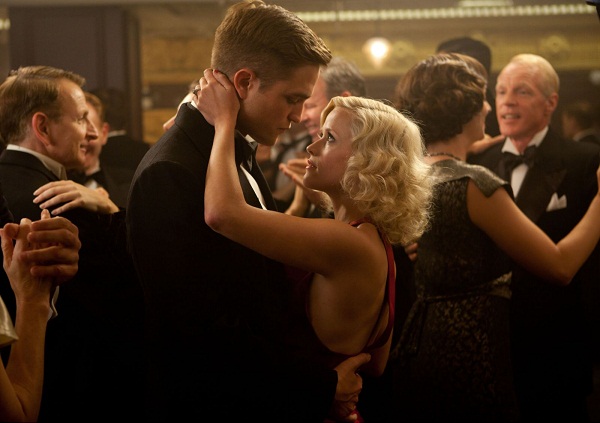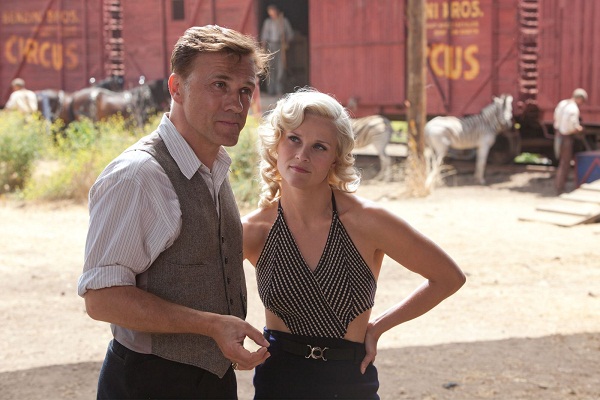Water for Elephants
Reviewed by Damien Straker on May 8, 2011
20th Century Fox
presents a film directed
by Francis Lawrence
Screenplay by Richard LaGravenese from the novel by Sara Gruen
Starring: Reese Witherspoon, Robert Pattinson, Christoph Waltz & Hal Holbrook
Running Time: 120 minutes
Rating: M15+
Released: May 12, 2011 |
7/10
|
An elderly man named Jacob (Hal Holbrook) stands in the rain, outside a modern day circus. When he's brought inside the office of Charlie (Paul Schneider) he recalls how he was once part of the Benzini Brothers circus company. Charlie urges him to talk about his experiences, remembering the magnitude of the company's disaster. As a younger man (Robert Pattinson), Jacob attends college during The Great Depression. However, just as he is about to take his final exam he is told that both his parents have been killed in a car accident. He loses his house too and with nothing to his name he follows a train line and boards a carriage. The crew belongs to the Benzini Brothers circus. They're initially hostile but they offer him a job shovelling horse manure. Walking into a tent one day, Jacob witnesses the beauty of Marlena (Reese Witherspoon), a horse tamer. He learns that she is also the wife of the head of the circus, August (Christoph Waltz). When he finally meets August his gift for animals is recognised and he's given the task of working with Marlena on a new act involving an elephant.

This handsome adaptation of Sara Gruen's bestselling novel is somewhat of a relic. It has the look and feel of a classic Hollywood studio picture. And that's a compliment because it's lavishly photographed by director Francis Lawrence and his cinematographer Rodrigo Prieto (a regular collaborator of Alejandro González Iñárritu). They've striven not for realism or authenticity but instead have created beautiful painterly-like images of a bygone era. The set pieces here are constructed and orchestrated with specified, controlled movements, like a moving artwork. The alignment of the men as they haul back the ropes of the tent poles, the night sky on top of the moving train and the grace of Marlena as she gestures for her horse to fall slowly to the ground, are images of a dream-like quality. This is of course in correspondence with August's belief that life is an illusion. We're mesmerised by the visuals but beneath the gloss are intentionally dark undertones, drawn from the film's intriguing context. Setting the film in the 1930s, just prior to the rise of fascism, is significant as it contextualises a number of ominous Darwinian references. August treats his workers and his animals as one: with contempt. Rumours circulate the circus that he's thrown workers off trains so that he won't have to pay them. It forces Jacob to hide a wounded worker so that he won't be murdered. August is equally barbaric to the animals too, jabbing an elephant to make it walk, asserting his master role.

August is at once compelling and repulsive and Waltz captivates in every one of his scenes. He's as charismatic, charming and sinister as he was in Inglourious Basterds. He's so precise in shifting between welcoming and dangerous that he could have invented the phrase 'keep your friends close and your enemies closer'. But the efforts to soften his character are also intriguing and rounding. Moments of impulsive violence and rage are contrasted with regret, as he remembers how conditional his relationship with Marlena is. He's a deeply flawed being but even she admits that he does provide her with a life of some kind. They need each other and thus it adds some needed complexity to their relationship. Witherspoon is just radiant in this film, with the look of a classic Hollywood starlet. The way she smiles when performing reminds us of the facade, the illusion of show business. By contrast, Pattinson brings little to his performance. He seems to have a lot less dialogue than Waltz and as such is given less to emotionally work with. He can't muster the same levels of charisma but its less significant here because there is already such a strong male performance. It's a shame that the film also ends in a more conventional, melodramatic and surprisingly violent fashion than what the rest of the film sets up for. And the bookends veer on corny, merely framing the narrative structure rather than contributing substantially to the plot. A fairly minor complaint though because it's a surprisingly rich film, as much as a spectacle. As with the film's deliberately sinister edges, there's a lot more happening underneath the curtain, thoroughly compensating for any missteps. |